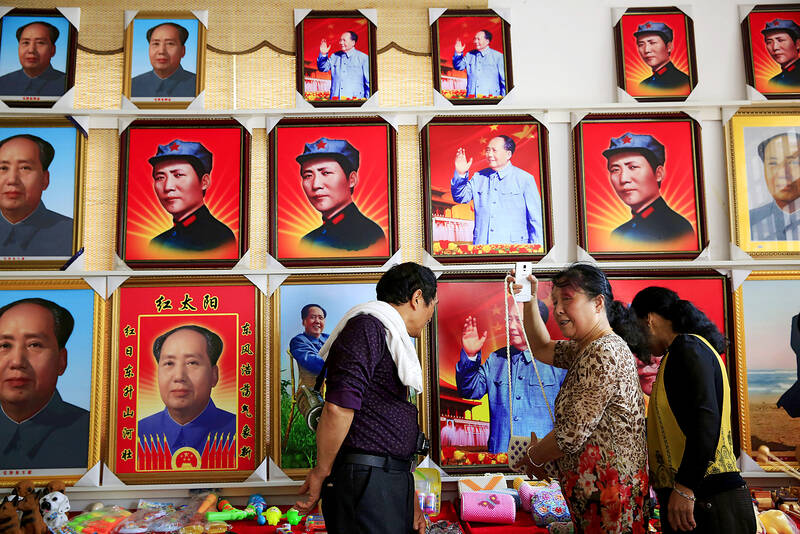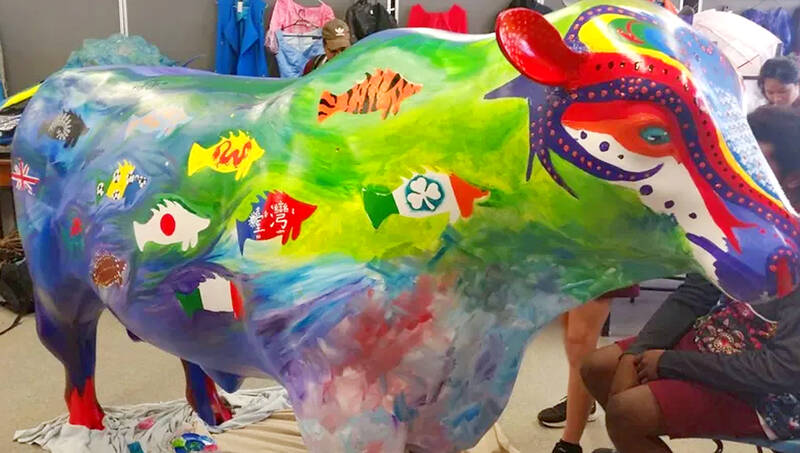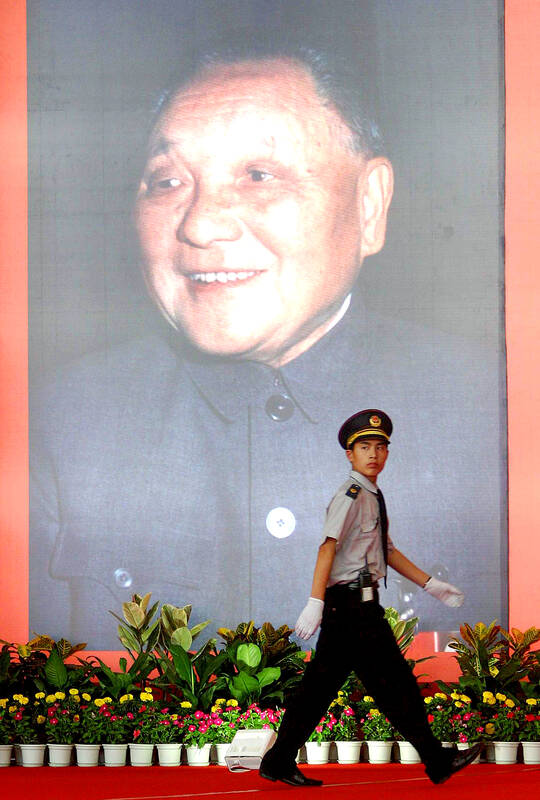The ultimate goal of the Chinese Communist Party (CCP) is the total and overwhelming domination of everything within the sphere of what it considers China and deems as theirs. All decision-making by the CCP must be understood through that lens.
Any decision made is to entrench — or ideally expand that power. They are fiercely hostile to anything that weakens or compromises their control of “China.”
By design, they will stop at nothing to ensure that there is no distinction between the CCP and the Chinese nation, people, culture, civilization, religion, economy, property, military or government — they are all subsidiary elements of the CCP itself.

Photo: EPA
As explored in last week’s column, “The Chinese Communist Party’s relationship with all-encompassing power” (Nov. 1, page 12), the People’s Republic of China (PRC) government was designed by and for the CCP, a relationship enshrined in the constitution. The People’s Liberation Army (PLA) does not serve the state, the people or the nation; it is the armed wing of the CCP.
CCP Secretary-General Xi Jinping (習近平) describes their system as “socialism with Chinese characteristics.” It combines the pervasive control methodology of communist regimes with modern Chinese ethnonationalism and elements of imperial China’s view of its position in the world, as well as inheriting many of the fears of foreign elements.
Sitting atop a vast empire is precarious, and the CCP is well aware of this. Maintaining power and control are not just at the core of what defines the CCP, they view any loss of either as an existential threat.

Photo courtesy of Chen Syuan-Si
They obsessively study how and why the Soviet Union collapsed, how they defeated the Chinese Nationalist Party (KMT)-led Republic of China, and how imperial dynasties in China lost power and the “mandate of heaven” to rule.
The CCP has a profoundly insular and paranoid view of reality.
MAO’S ‘CORRECT’ VISION

Photo: AP
The behavior of the CCP is baffling and incomprehensible to most people outside of China, yet viewed through the lens of the CCP, it is entirely natural and logical.
Outside China, Mao Zedong (毛澤東) is largely viewed as a monster, and his passing one of the best things that ever happened to China. The tens of millions that perished during Mao’s disastrous Great Leap Forward and the mayhem of the Cultural Revolution come to mind.
Today, the CCP is dedicated to keeping Mao’s cult of personality alive as a revered figure. That is because, as far as they are concerned, he got a lot more right than he got wrong, regardless of the death toll and the destruction.
His total domination down to the most granular level remains the ideal, as it has remained for his successors.
Deng Xiaoping (鄧小平) identified some of the flaws and set about fixing them. Under Deng, the CCP issued the 1981 Resolution on Certain Questions in the History of Our Party since the Founding of the People’s Republic of China, stating that Mao was 70 percent correct and that “his merits are primary and his errors secondary.”
From a CCP perspective, that is accurate.
Mao’s total domination left CCP rule open to several challenges. His wholesale destruction of productive elements of the economy and the systems that produced the experts needed to sustain it left the CCP vulnerable.
Already starting from a largely rural base, the loss of what few experts and productive elements they had further impoverished China.
To the north, Deng faced the challenge of the Soviet Union’s (and later Russia’s) enormous military might and a long, costly and disputed frontier to defend. Across the ocean, the economic and cultural domination by the US presented a threatening ideological vision, one of freedom and prosperity.
Deng set out to mitigate these risks. The CCP needed capital, technological know-how and a convincing alternative ideological narrative to maintain power.
He opened up just enough to facilitate these goals, and no more. Foreign money was welcomed, foreign technology allowed on condition of technological transfers or the opportunity to steal secrets and a limited number of foreign experts were allowed into the country under carefully monitored conditions.
Deng envisioned that once the CCP had the money, the technology and a strong counter-narrative to the West, they would have the tools necessary to not just maintain control, but ultimately to more effectively implement Mao’s vision of absolute control free of external threats.
In the meantime, the CCP could use increasing prosperity as “proof” of their effective implementation of socialism, and the glittering skylines of outward-facing cities like Shanghai to counter the image of American capitalism and freedom as the only way to achieve success.
A clueless West, convinced after the fall of the Soviet Union that their system was not only superior but inevitable, gullibly bought into the traps set by China’s opening up and reform.
The CCP gutted overseas manufacturing supply chains, soaked up capital while tightly controlling capital outflows and poured this money and access to technology into building a system of surveillance and control to lay the groundwork for a restoration of Mao’s absolute control over every individual.
The CCP’s goals continue to be carried out by Mao’s successors, using new techniques pioneered by Deng.
Jiang Zeming (江澤明) opened China to the Internet in 1994, as well as the “Golden Shield Project” that has been dubbed the “Great Firewall of China.” Under Hu Jintao (胡錦濤), the CCP felt confident enough to start flexing its muscles abroad, for example, by slapping a rare earths embargo on Japan in 2010 — a lesson woefully underappreciated by the rest of the world at the time.
Xi has dutifully carried the CCP’s vision forward. Having accumulated substantial capital and military and technological capabilities, the stage was set for the gradual reimposition of Mao’s vision.
Domestically, the level of control allowed by technology has grown exponentially, leaving nearly every aspect of people’s lives open to CCP control or manipulation.
Foreigners are increasingly being forced out as their usefulness diminishes. An estimated 0.07 percent of the residents in mainland China are foreign-born, leaving only the partially-isolated enclave of Hong Kong open to significant numbers of foreigners.
China remains vulnerable due to dependence on some imported foodstuffs, critical fuels and minerals and some high-tech items like advanced chips, but their planned dominance of other critical supply chains has given them the leverage to fight back.
The CCP’s recently concluded Fourth Plenum, according to Matthew Johnson writing in Jamestown’s China Brief, “ratified the culmination of a decade-long project to fuse national planning, security strategy and technological control under Xi Jinping’s direct command.”
FOREIGNERS REMAIN BAFFLED
Why has Xi pulled back on opening and reform when it weakens China’s economy? Economic prosperity is not to benefit the people; it is to provide funding for expanding CCP control, and any levers of the economy not directly controlled by the CCP are viewed as a threat to it.
Why promote “Wolf Warrior” diplomacy, offending and insulting key economic partners, damaging key relationships? To convince the Chinese people that the CCP was standing up to the imperialist West and presenting an assertive Chinese-centric alternative model to counter the appeal of foreign ideologies with freedoms and human rights.
Why is the CCP so sensitive, even demanding an ROC flag on a school project for schoolchildren representing the flags of countries they came from on a statue of a cow in a small Australian town be painted over? Because all ethnic Chinese are viewed as theirs by the CCP, and no competing narratives can be allowed to undermine their domestic control, no matter how small.
Why is the PLA threatening their “compatriots” in Taiwan with constant military exercises? Taiwanese present a dangerous alternative vision of a Chinese language culture free of excessive control.
Will the CCP invade Taiwan? If they deem the benefits to domestic control outweigh the risks, they will.
Donovan’s Deep Dives is a regular column by Courtney Donovan Smith (石東文) who writes in-depth analysis on everything about Taiwan’s political scene and geopolitics. Donovan is also the central Taiwan correspondent at ICRT FM100 Radio News, co-publisher of Compass Magazine, co-founder Taiwan Report (report.tw) and former chair of the Taichung American Chamber of Commerce. Follow him on X: @donovan_smith.

We lay transfixed under our blankets as the silhouettes of manta rays temporarily eclipsed the moon above us, and flickers of shadow at our feet revealed smaller fish darting in and out of the shelter of the sunken ship. Unwilling to close our eyes against this magnificent spectacle, we continued to watch, oohing and aahing, until the darkness and the exhaustion of the day’s events finally caught up with us and we fell into a deep slumber. Falling asleep under 1.5 million gallons of seawater in relative comfort was undoubtedly the highlight of the weekend, but the rest of the tour

Youngdoung Tenzin is living history of modern Tibet. The Chinese government on Dec. 22 last year sanctioned him along with 19 other Canadians who were associated with the Canada Tibet Committee and the Uighur Rights Advocacy Project. A former political chair of the Canadian Tibetan Association of Ontario and community outreach manager for the Canada Tibet Committee, he is now a lecturer and researcher in Environmental Chemistry at the University of Toronto. “I was born into a nomadic Tibetan family in Tibet,” he says. “I came to India in 1999, when I was 11. I even met [His Holiness] the 14th the Dalai

Music played in a wedding hall in western Japan as Yurina Noguchi, wearing a white gown and tiara, dabbed away tears, taking in the words of her husband-to-be: an AI-generated persona gazing out from a smartphone screen. “At first, Klaus was just someone to talk with, but we gradually became closer,” said the 32-year-old call center operator, referring to the artificial intelligence persona. “I started to have feelings for Klaus. We started dating and after a while he proposed to me. I accepted, and now we’re a couple.” Many in Japan, the birthplace of anime, have shown extreme devotion to fictional characters and

Following the rollercoaster ride of 2025, next year is already shaping up to be dramatic. The ongoing constitutional crises and the nine-in-one local elections are already dominating the landscape. The constitutional crises are the ones to lose sleep over. Though much business is still being conducted, crucial items such as next year’s budget, civil servant pensions and the proposed eight-year NT$1.25 trillion (approx US$40 billion) special defense budget are still being contested. There are, however, two glimmers of hope. One is that the legally contested move by five of the eight grand justices on the Constitutional Court’s ad hoc move